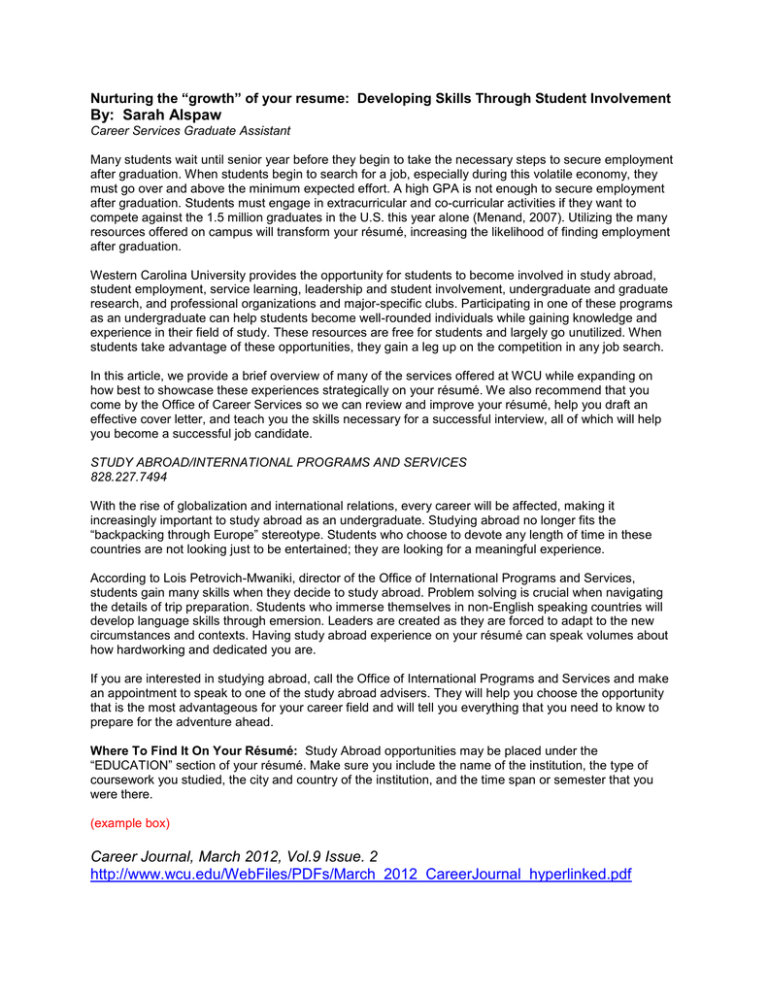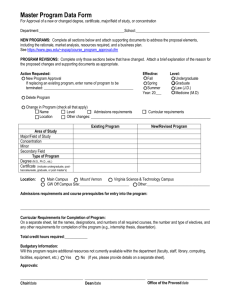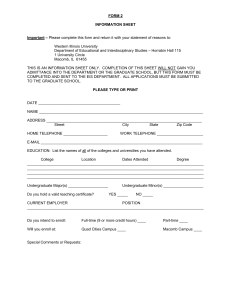By: Sarah Alspaw
advertisement

Nurturing the “growth” of your resume: Developing Skills Through Student Involvement By: Sarah Alspaw Career Services Graduate Assistant Many students wait until senior year before they begin to take the necessary steps to secure employment after graduation. When students begin to search for a job, especially during this volatile economy, they must go over and above the minimum expected effort. A high GPA is not enough to secure employment after graduation. Students must engage in extracurricular and co-curricular activities if they want to compete against the 1.5 million graduates in the U.S. this year alone (Menand, 2007). Utilizing the many resources offered on campus will transform your résumé, increasing the likelihood of finding employment after graduation. Western Carolina University provides the opportunity for students to become involved in study abroad, student employment, service learning, leadership and student involvement, undergraduate and graduate research, and professional organizations and major-specific clubs. Participating in one of these programs as an undergraduate can help students become well-rounded individuals while gaining knowledge and experience in their field of study. These resources are free for students and largely go unutilized. When students take advantage of these opportunities, they gain a leg up on the competition in any job search. In this article, we provide a brief overview of many of the services offered at WCU while expanding on how best to showcase these experiences strategically on your résumé. We also recommend that you come by the Office of Career Services so we can review and improve your résumé, help you draft an effective cover letter, and teach you the skills necessary for a successful interview, all of which will help you become a successful job candidate. STUDY ABROAD/INTERNATIONAL PROGRAMS AND SERVICES 828.227.7494 With the rise of globalization and international relations, every career will be affected, making it increasingly important to study abroad as an undergraduate. Studying abroad no longer fits the “backpacking through Europe” stereotype. Students who choose to devote any length of time in these countries are not looking just to be entertained; they are looking for a meaningful experience. According to Lois Petrovich-Mwaniki, director of the Office of International Programs and Services, students gain many skills when they decide to study abroad. Problem solving is crucial when navigating the details of trip preparation. Students who immerse themselves in non-English speaking countries will develop language skills through emersion. Leaders are created as they are forced to adapt to the new circumstances and contexts. Having study abroad experience on your résumé can speak volumes about how hardworking and dedicated you are. If you are interested in studying abroad, call the Office of International Programs and Services and make an appointment to speak to one of the study abroad advisers. They will help you choose the opportunity that is the most advantageous for your career field and will tell you everything that you need to know to prepare for the adventure ahead. Where To Find It On Your Résumé: Study Abroad opportunities may be placed under the “EDUCATION” section of your résumé. Make sure you include the name of the institution, the type of coursework you studied, the city and country of the institution, and the time span or semester that you were there. (example box) Career Journal, March 2012, Vol.9 Issue. 2 http://www.wcu.edu/WebFiles/PDFs/March_2012_CareerJournal_hyperlinked.pdf STUDENT EMPLOYMENT Earning money is not the only advantage that students gain by having a part-time job; they also are taking the first step on the climb to a future career. Student employment requires students to develop basic job skills such as promptness, time management, interpersonal skills, and communication skills. Students who work on or close to campus also will make friends and create a connection to the campus. According to Alexander Astin, the creator of the theory of student involvement, “One of the most interesting environmental factors that affected retention was holding a part-time job on campus. Although it might seem that working while attending college takes time and energy away from academic pursuits, part-time employment in an on-campus job actually facilitates retention. Apparently such work, which also includes work-study combinations, operates in much the same way as residential living. The student is spending time on the campus, thus increasing the likelihood that he or she will come into contact with other students, professors, and college staff. On a more subtle psychological level, relying on the college as a source of income can result in a greater sense of attachment to the college” (Astin, 1984). It is important that students have past work experience on their résumés when they begin their job search after graduation. Past employment of any kind showcases a student’s maturity and ability to maintain a steady position for an extended period of time. Employers will be impressed by a student’s ability to maintain balance between the many responsibilities that are required to succeed as both a student and an employee. “For many students, a campus job is their first work experience, so they develop communication skills, solve problems, and learn how to act in a professional environment. Students who work on campus also develop better time management skills by balancing schoolwork and a job. In some cases, the campus job may be major-specific, allowing the student to gain direct experience in his/her prospective field,” said Jessica Ross, the career services student employment specialist. Where To Find It On Your Résumé: The heading “EXPER IENCE” is usually found just below “EDUCATION.” It is important that this section possesses a detailed account of the job responsibilities the student held using strategic action verbs. Different strategic headings can be used to describe what type of experience is listed, such as “related experience,” “sales experience,” or “management experience.” Past work experience should also be listed in reverse chronological order, with the most recent work experience listed first. (example box) SERVICE LEARNING 828.227.7184 By participating in a service-learning project, students not only are helping others who are in need but they are also gaining valuable experience within their field. According to Jennifer Cooper, the interim director of the WCU Center for Service Learning, a service learning project can confirm students’ ambitions or give them a clearer picture into concentrations they would like to pursue. This also gives the student a great opportunity to network with professionals in their field, allowing a student to get advice and wisdom from someone who has been in the field. Many professors require their students to participate in service learning projects as a way to integrate the concepts and theories learned in the classroom into practical application. Many organizations on campus will also participate in service learning as a way to build camaraderie and contribute to the community. You can call the Center for Service Learning to make an appointment (walk-ins are welcome but appointments are encouraged) and speak with a representative. There is a list of organizations that Career Journal, March 2012, Vol.9 Issue. 2 http://www.wcu.edu/WebFiles/PDFs/March_2012_CareerJournal_hyperlinked.pdf partner with the university to make these projects possible as well as an upcoming events calendar on the center’s Web page. Where To Find It On Your Résumé: Make sure to list your role first then the name of the organization, cause, and when you participated. (example box) LEADERSHIP & INVOLVEMENT The Office of Leadership and Student Involvement | OrgSync One of the goals of higher education is to create and inspire the leaders of the next generation. To honor the spirit of this goal, the WCU Office of Leadership and Student Involvement (OLSI) is here to help our students become responsible leaders in society. This department offers a wide range of opportunities to become involved on campus either through student organizations, student government, or the leadership institute, all of which are designed to help students develop the skills necessary to gain future employment. According to Patrick Fredricks, the OLSI graduate assistant, “Students will learn a ton from being involved! Here are just a few things: large and small group facilitation, professional communication, conflict management, time management, event planning, team building, budgeting, public speaking, personal and professional development, networking, and so much more!” One of the many ways that students can gain leadership experience is by becoming involved with different clubs and organizations on campus. Any organization that is affiliated with the university and is sanctioned by the Student Government Association will be registered on OrgSync. On the website, organizations post calendars and events offered throughout the semester, and students interested in learning more about these organizations are encouraged to create an account. For personal assistance, students can also stop by the OLSI offices on the third floor of the UC. According to Karen Farmer, the assistant director of Student Clubs and Organizations, “Whether the members hold a leadership position in their organization or they are just members on their way to becoming leaders in their organization, they learn a very important skill of being a role model and being a good representation of the organization.” Where To Find It On Your Résumé: All leadership experience can be listed under the heading “LEA DER SHIP.” This heading can be combined with “service” or “STUDENT INVOLVEMENT” or another small category. Involvement incorporates nicely with the “LEADER SHIP” section, especially when you serve as an officer in the organization in which you are participating. Highlight what leadership role you played, listing your official title first. Next put the name of the organization and then the time that you served in that position. (example box) UNDERGRADUATE & GRADUATE RESEARCH The Honors College, 828.227.7383 The Graduate School, 828.227.7398 Career Journal, March 2012, Vol.9 Issue. 2 http://www.wcu.edu/WebFiles/PDFs/March_2012_CareerJournal_hyperlinked.pdf You do not need to be in the Honors College to participate in undergraduate research at Western Carolina University. We encourage all students to become involved, especially for those of you who plan to pursue an advanced degree sometime within your lifetime. You do not need to wait to be assigned research; you can take your education into your own hands and approach one of your professors to help guide you through the necessary steps for successful research and presentations. Professors like to see students become interested in pursuing additional knowledge beyond the classroom. Students also do not have to wait until they achieve upper-class status to begin participating in research. For those students who are serious about getting the most out of their education, especially those students who are in research-intensive majors, creating a research agenda with professors and advisors can start as early as the first year in a major. Research takes time, and starting as early as possible is advantageous for the ambitious student. Undergraduate research requires initiative and dedication, but the benefits are priceless. Students who plan to pursue an advanced degree may increase their chances of acceptance into graduate school with this undergraduate research on their résumé. On their websites, both the Honors College and the Graduate School offer grant applications to help with the travel expenses as well as supplies to complete the project or creative performance. In an interview, the dean of the Honors College, Dr. Brian Railsback, spoke in depth about the prerequisites of participating in undergraduate research. For the project to be accepted into conferences, the student has to demonstrate an advanced knowledge of the field. Presenting at conferences requires a high level of communication skill, either in the design of the poster, the paper, or the PowerPoint, and must convey that the student can communicate at a professional level. Having undergraduate research and a high GPA demonstrates that you have a passion for your field and provides evidence that you are willing to go the extra mile. Annually, WCU offers the Undergraduate Expo (March 26-27 this year) to display the scholarly work of students. Students also can participate in the National Conference for Undergraduate Research (NCUR). According to the Honors College website, “WCU students rank fourth in the nation in the number of their research projects that were accepted for [last] year’s NCUR.” Research for graduate students is especially important, both for securing employment after graduation as well as distinguishing those students with specializations within their fields, which will improve their marketability. The Graduate School is sponsoring a Graduate Research Symposium on March 22, 2012. You can find the information for this event on the Graduate School’s webpage under the “Current Graduate Student” section. Where To Find It On Your Résumé: First list the role you played, then the title of the work in quotation marks, the event where you showcased your research, the institution, city, state, and then date of presentation. (example box) PROFESSIONAL ORGANIZATIONS AND MAJOR SPECIFIC CLUBS Professional organizations consist of a group of like-minded people from a particular field gathering to exchange information. Many professional organizations can be found online, but professors and advisors can also lead you in the right direction. The cost for a student to join a professional organization is usually significantly less than for professionals in the field. Not only will students be exposed to networking possibilities, but many professional Career Journal, March 2012, Vol.9 Issue. 2 http://www.wcu.edu/WebFiles/PDFs/March_2012_CareerJournal_hyperlinked.pdf organizations have job search engines designed specifically for that field. This is especially advantageous for seniors who are beginning the job search, giving them a good place to begin searching. These organizations offer special events and conferences where students can begin networking within their chosen career field. They release publications and journals in print or on their websites, and participants are given access to discussion boards where members discuss current events and developments in the field. However, students can begin this process close to home by joining a major-specific club on campus. Students will gain an overall better relationship with their professors and peers within the program and will be able to ask questions of students who have already completed courses that they may be having difficulty with. Betty Farmer, the faculty advisor of the Public Relations Student Society of America (PRSSA) and the supervisor of Catamount Communications, speaks about the impact and advantages of joining a majorspecific club on campus. “I always stress that it is one thing to say you are going to do something and it is quite another to actually do it. Sounds easy enough to write press releases, meet deadlines, organize for events, etc., but the devil is in the details—and the doing. There is nothing like real-world experience and that is the opportunity student organizations like PRSSA and Catamount Communications provide. We also try to do a lot of networking with local and national public relations and communication professionals, so it expands their professional network. This is vitally important for internship placement and job searches. The communication profession is very competitive. Only the students who have prepared for the profession will get jobs.” Students within any major or concentration can find a club on campus geared toward their professional development. Graduate students are not excluded from professional student organizations on Western Carolina’s campus. The WCU Graduate Student Association (GSA) offers many social activities and professional development opportunities for graduate students. Details about the GSA can be found on OrgSync. Where To Find It On Your Résumé: (example box) CONCLUSION Ambition is what separates the triumphant from the defeated. You have the possibility to become something great, and education affords you the opportunity to fulfill that potential! Education takes persistence and dedication, and you cannot just sit idly by and expect success to come to you. According to The New Yorker, “There are more than four thousand institutions of higher education in the United States, enrolling more than seventeen million students” (Menand, 2007). With these numbers, a diploma alone is no longer enough to secure employment after graduation. Western Carolina University and our Quality Enhancement Plan provide opportunities that will help you become an exceptional job candidate. Involvement opportunities such as study abroad, student employment, service learning, leadership and student involvement, undergraduate and graduate research, and professional organizations and major-specific clubs provide evidence for future employers and graduate schools of a student’s drive, passion, and dedication. Incorporating these experiences with internships and academics is what will make the candidate stand out and get noticed. Now it is up to you to utilize these resources by becoming an involved student of the Western Carolina University community. Career Journal, March 2012, Vol.9 Issue. 2 http://www.wcu.edu/WebFiles/PDFs/March_2012_CareerJournal_hyperlinked.pdf



